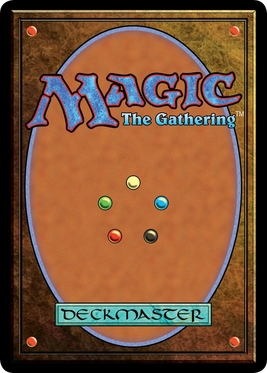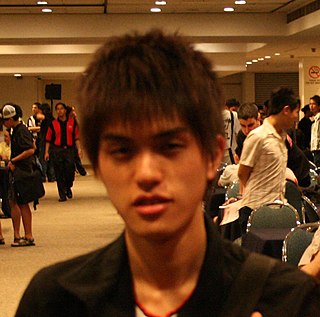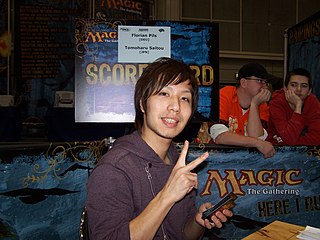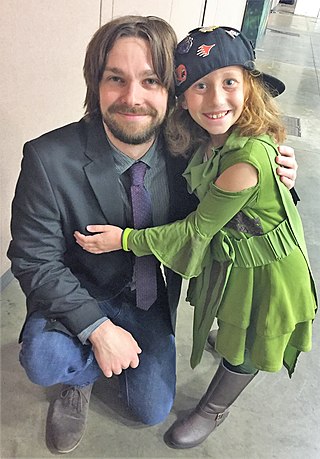
Magic: The Gathering is a tabletop and digital collectable card game created by Richard Garfield. Released in 1993 by Wizards of the Coast, Magic was the first trading card game and had approximately thirty-five million players as of December 2018, and over twenty billion Magic cards were produced in the period from 2008 to 2016, during which time it grew in popularity.
The Magic: The Gathering World Championships(Worlds) have been held annually since 1994. It is the most important tournament in the game of Magic: The Gathering, offering cash prizes of up to $100,000 to the winners. With the exception of the first edition, Worlds is an invitation-only event, and from 1996 to 2011 World was the last event of each Pro Tour season. The invitees were mostly top finishers from the National championships, the top-ranked players of the DCI and high-level pro players. Since 2012 the World Championships are held after the season and the most successful 16 or 24 players have been invited to the tournament.

The Wizards Play Network (WPN) is the official sanctioning body for competitive play in Magic: The Gathering (Magic) and various other games produced by Wizards of the Coast and its subsidiaries, such as Avalon Hill. Originally, it was known as the DCI but was rebranded in 2008. The WPN provided game rules, tournament operating procedures, and other materials to private tournament organizers and players. It also operated a judge certification program to provide consistent rules enforcement and promote fair play. The DCI's name was still commonly used, however, to refer to the player registration number until 2020.
The Players Tour (PT) is a competitive international league for the Magic: The Gathering collectible card game, culminating in the World Championship. It consists of a series of tournaments held throughout the world, each requiring an invitation to participate. The Players Tour permanently replaced the Pro Tour in the 2020 season. Every PT awards a total of $250,000 in cash prizes, with $50,000 going to the winner. The Players Tour is split into three regions: Americas, Europe, and Asia-Pacific. Each region hosts three events, resulting in nine Players Tour events per season.
Jon Finkel is an American Magic: The Gathering and poker player. Finkel is one of the most decorated players in the history of professional Magic: The Gathering play and is widely regarded as one of the greatest players of all-time. During his career he has won three Grand Prix events and made the Top 8 of a record 16 Pro Tour events, winning three of those. In the year 2000, he became the Magic: The Gathering World Champion, as well as playing for the United States National Team, which won the team portion of the competition.
The Magic: The Gathering Pro Tour Hall of Fame was started in 2005 to honor the most successful Magic: The Gathering Pro Tour players. The first inductions came on the tenth anniversary of the first Pro Tour event, and new Hall of Famers will be determined annually. Players who are eligible for the ballot can be voted in the Hall of Fame if they get more than 60% of the election committee's votes. As of 2018, there are 48 players from 12 countries in the Hall of Fame.
Grands Prix (GPs) are professional Magic: The Gathering tournaments, awarding cash prizes, Pro Points and invitations to Pro Tours. They are open to all players and are usually the biggest Magic tournaments. The first Grand Prix was held on 22–23 March 1997 in Amsterdam (Netherlands). By the end of 2018, 654 Grand Prix events have been held, the biggest being GP Las Vegas 2015 with 7,551 competitors, making it the biggest trading card game tournament ever held.
Robert Maher Jr., is a professional Magic: The Gathering player. He picked up the Magic game after sustaining a football injury in high school, and has gone on to become one of the most celebrated players in the game's history, earning the nickname "The Great One".
Magic: The Gathering formats are various ways in which the Magic: The Gathering collectible card game can be played. Each format provides rules for deck construction and gameplay, with many confining the pool of permitted cards to those released in a specified group of Magic card sets. The Wizards Play Network, the governing body that oversees official Magic competitive play, categorizes its tournament formats into Constructed and Limited. Additionally, there are many casual formats with the Commander format being one of the most popular formats of the game.

Kenji Tsumura is a professional Magic: The Gathering player from Japan. He is one of only eight players to have reached the top eight of a Pro Tour more than five times.

Tomoharu Saitou is one of the most successful professional Magic: The Gathering players and the owner of Hareruya Store in Tokyo.
Carlos Eduardo Romão is a Brazilian Magic: The Gathering player. He is known for his win at the 2002 World Championships. Along with Diego Ostrovich, he is widely regarded as the first South American to achieve success on the Pro Tour, and was the first South American to win a Pro Tour.
Yuuya Watanabe (渡辺雄也) is a Japanese Magic: The Gathering player and former World Champion. With five Pro Tour top eights and 27 Grand Prix top eights, Watanabe is best known for his Rookie of the Year title in 2007, and his Player of the Year titles in 2009 and 2012. He is one of only three players to become Player of the Year more than once. He was elected to the Magic: The Gathering Hall of Fame in 2016, along with Owen Turtenwald, but removed in May 2019 after a cheating scandal involving marked card sleeves.
Mark Herberholz is an American Magic: The Gathering player. He is best known for winning Pro Tour Honolulu in 2006, and for designing the Heezy-street deck he used to win the tournament. More recently, Herberholz has attracted attention for his deck designs in collaboration with Gabriel Nassif and Patrick Chapin. He appeared on The Price Is Right on December 9, 2005 and won $5,850 in cash and prizes.
The 2012 Pro Tour season is the seventeenth season of the Magic: The Gathering Pro Tour. Due to major changes in the Pro Tour systems the 2012 season was retroactively made to overlap with the 2011 season. Originally the 2012 season was supposed to begin on 7 January 2012 with Grand Prix Austin, but retroactively the events from after Pro Tour Nagoya on 10–12 June 2011 were made to count towards the 2012 season as well as the 2011 season. The major changes included a shift of the season. Instead of Pro Tour seasons aligning with the calendar year, beginning with the 2012–13 season Pro Tour seasons will be going from spring to spring. Also a major overhaul of the ratings system was conducted. A new bye policy based upon the new ratings system and a new invitation policy for the Pro Tour were introduced. Finally the number of Grand Prix tournaments was greatly increased.

Reid Duke is an American Magic: The Gathering player from Sugar Loaf, New York. He won the Magic: The Gathering Online Championship in 2011. His best finishes include three Pro Tour Top 8s, at Pro Tour Journey Into Nyx, Pro Tour Eldritch Moon, and Pro Tour Rivals of Ixalan, a runner-up finish at the 2013 World Championships, and wins at Grand Prix Nashville 2012, Grand Prix Miami 2013, Grand Prix Portland 2014, Grand Prix Oakland 2016, Grand Prix Louisville 2017, Grand Prix Cleveland and Pro Tour Phyrexia.
Tom Martell is an American Magic: The Gathering player. He won Pro Tour Gatecrash in 2013. His other notable finishes include another Pro Tour top 8 at Pro Tour Paris 2011, as well as three Grand Prix wins.
Joel Larsson is a Swedish professional Magic: The Gathering player. He is most known for winning the Pro Tour Magic Origins competition in August 2015, and for his skills in limited formats. Joel had the highest win percentage in the world in limited matches during the 2011-2012 Pro Tour season. He is also known for winning the first Players Tour in 2020.
The Magic: The Gathering Judge Program is an independent organization that trains, certifies, and manages Judges, the tournament officials who run tournaments of the trading card game Magic: The Gathering. The Judge Program was founded early in the game's history as part of the DCI, the game's original sanctioning body, but has since become an independent, peer-driven organization, selecting its own leadership. In 2019, a new corporation, Judge Academy LLC, took up responsibility for the program.







